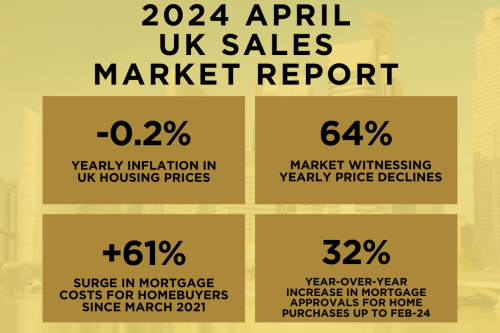- Free Valuation
- Competitive Sales Commission Fees
- Free Mortgage Advice

posted 7th May 2024
The latest report on property sales in the UK for April reveals a notable resurgence in sales volumes, contrasting with relatively stable house prices. This trend suggests a more balanced housing market compared to pre-pandemic levels, offering increased opportunities for prospective homebuyers in 2024, provided sellers maintain realistic pricing strategies. The static prices also contribute to sustained affordability levels.
Sales Agreements Surge:
The housing market has witnessed a sustained increase in new sales agreements, with a notable 12% year-on-year rise. This upward trajectory has persisted for the past four months, signaling a rebuilding of the sales pipeline after a period of subdued activity, particularly during spikes in mortgage rates in 2022 and 2023. Projections indicate the market is on track to achieve 1.1 million sales completions in 2024, reflecting a significant 10% increase from the previous year.
Recovery Reflected in Mortgage Approvals:
The rebound in sales is also mirrored in mortgage approvals for home purchases, which surged by 32% in February 2024, approaching pre-pandemic levels. However, the lag time of 4 to 6+ months between agreeing to a sale and completion means that the full impact of this uptick in activity is yet to be reflected in completion data.
Stable House Price Inflation:
Despite the surge in sales, house price inflation remains broadly stable, with an annual rate of -0.2% recorded at the end of March 2024. While prices continue to decline, particularly in regions covering southern England and the East Midlands, the rate of decline has slowed. Conversely, market activity has propelled house price inflation into positive territory across regions in northern England, West Midlands, Wales, Scotland, and Northern Ireland.
Adjustment to Mortgage Rate Changes:
The housing market is still adapting to the cessation of ultra-low mortgage rates since 2022, with rates experiencing two significant spikes in the past two years. Although average mortgage rates have receded to 4.5% in recent months, they have shown signs of upward drift, potentially influenced by expectations of future interest rate cuts. This adjustment has led to a 61% increase in annual mortgage repayments for home purchases compared to March 2021, posing challenges to affordability.
Regional Disparities in Mortgage Impact:
Southern England bears the brunt of higher mortgage rates, with a 50% to 70% increase in mortgage repayments for typical buyers between 2021 and 2024. This escalation in costs is compounded by higher house prices and stamp duty expenses, particularly affecting regions like London where the annual cost of mortgage repayments for an average-priced home has risen by £7,500 compared to 2021.
Market Resilience and Buyer Adaptation:
Despite these challenges, there's no significant evidence of buyers downsizing in response to higher borrowing costs. Instead, some are exploring options further afield to secure affordable housing. Approximately six in ten homes in markets across southern England are still experiencing annual price falls, although the severity of these declines has lessened compared to previous years.
Outlook and Stability:
Looking ahead, the housing market is expected to continue its trajectory of firming prices without a significant uptick in house price inflation. The divergence between southern regions and the rest of the UK is anticipated to persist, contingent upon future interest rate developments. Maintaining price stability remains crucial for fostering sustained growth in sales and market confidence.






